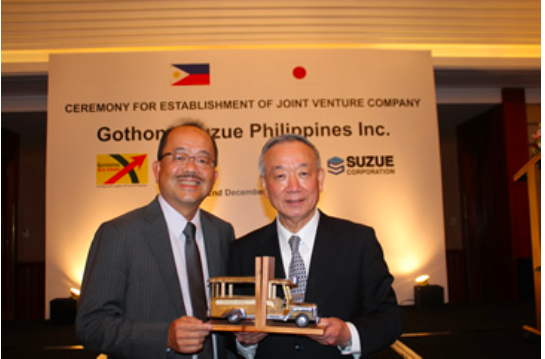
Bob Gothong, chief executive officer of Gothong Southern Group, (left) seals a partnership deal with a Japanese company in this January 2017 photo. Gothong in an interview on January 15, 2019, has warned about the adverse implications of the additional fuel excise tax on Cebuano companies. CDN file photo
CEBU CITY, Philippines — Businesses face rising operating costs and lower net income due to the imposition of the additional P2 excise tax on oil products.
Bob Gothong, chief executive officer of Gothong Southern group, admitted that the higher excise tax on diesel and gasoline meant higher operating costs for the company.
Gothong Southern comprised of companies engaged in shipping and logistics businesses.
Gothong said that fuel would continue to be a major operating expense in running the company’s vessels.
“Year on year, our fuel cost has increased by 33 percent due to fuel price hike. Of the 33 percent increase, one third is contributed by the excise tax implementation,” he disclosed.
Fuel at 49 percent accounts for almost half of the company’s operating costs, Gothong said.
However, the company has implemented an excise tax recovery fee (ETRF) in 2018 to help recover the increase in fuel cost, he explained.
With the implementation of the additional excise tax, Gothong Southern has to implement another round of ETRF, Gothong said.
On top of the additional excise tax, the company has to contend with the rising fuel prices.
He said that they would have to pass these fuel price increase brought about by the increase in world market prices to the customers through the bunker surcharge.
When asked whether he favors the suspension of the additional excise tax, Gothong encouraged the government planners to look at financial indicators to determine whether to continue the implementation of the additional excise tax.
“Inflation has gone up. Forex has gone up. Interest cost has also risen.
While, we have noted the world oil prices continue to go up,” he pointed out.
According to Gothong, different financial experts projected a rising trend of oil prices, ‘which may hover between $75 to $80 per barrel in 2019.’
‘It would be best for government to review the timing of the 2nd round of excise tax to help mitigate the adverse impact to the consumers,” he said.
Jay Aldeguer, president and CEO of Island Group, says that companies have to come up with strategies to remain competitive. Photo courtesy of Island Group website
On the other hand, manufacturing companies have to come up with strategies to remain competitive or price themselves out of the market.
“The effect on our business will be mainly in the rise in costs of raw materials, supplies and logistic related expenses. We have to be constantly vigilant in protecting our margins especially with these rising costs and lower retail prices.” said Jay Aldeguer, president and chief executive officer of The Island Group.
The Island Group owns and operates Island Souvenirs, Island Banca Cruises and Island Stay Hotels.
Aldeguer cited the very volatile business environment in the past decade or so as well as the trend on low cost items.
“We’ve focused on protecting our margins by continuously working towards production efficiency and better sourcing of products and raw materials,” he explained. These helped the company cope with the rising costs, Aldeguer added.
“Sales, fortunately, has been increasing dramatically over the past years, especially now with tourism on the upswing,” he said.
Rey Calooy, founder and president of RNC Marketing Philippines, says businesses has to find ways to increase productivity to counter adverse effects of additional excise tax on fuel. (Facebook page photo)
Another entrepreneur agreed that tourism has helped boost Cebu economy.
Rey Calooy, founder and president of RNC Marketing Philippines, noted that the increased arrival of both domestic and international tourists has generated businesses for other sectors.
RNC Marketing produces small packs of sugar, coffee and milk as well as noodles Kapinoy products.
However, he maintained that the additional excise tax would affect not only businesses and consumers but also other sectors as well.
Calooy noted that farmers who use tractors and other mechanized equipment as well as fishermen who use fuel for their boats, would incur higher fuel expenses.
The increase of fuel prices would eventually result in increased prices of goods and services, he pointed out.
Calooy, also the founder of the Filipino Cebuano Business Club Inc. (Filceb), noted that the first phase of excise tax implemented January last year had resulted in increased operating costs for their members.
“We are consumers too. We buy raw materials from our suppliers who have to increase their prices,” he said.
Calooy cited the experience of a Filceb member engaged in offering repair and maintenance of air conditioning units.
Before the increase in oil prices, the member could service 10 clients. Upon the implementation of the excise tax last year, the company could only serve four clients.
Calooy said that businesses would have to implement measures to increase productivity to be able to overcome the increase in costs./dbs

